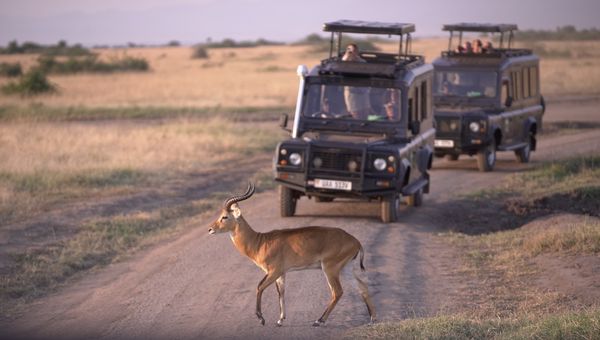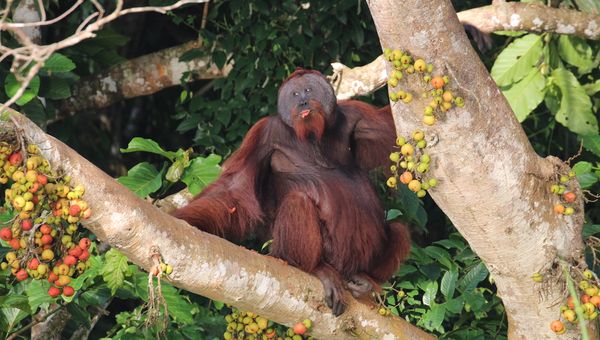
Photo Credit: National Geographic Expeditions
Learning from wildlife experts during bucket list adventures is a must for an enriching experience. Here is the best way for travel advisors to sell premium wildlife travel while still protecting nature for future generations.
For many travelers, seeing wildlife in their natural habitat can be life altering. The key to this immersive type of travel often lies in the knowledge of tour operators and the experts who guide clients. Travel advisors who sell this type of travel — conservation and protection of land and animal life – also play an integral role by ensuring their clients are partnered with the highest caliber of wildlife travel experts for the ultimate experience.
“You cannot go on safari, see wild animals in their natural habitat and not come back from that trip a changed person,” says Sheena Dersidan, a luxury travel advisor with IAMSHEGLOBAL, an independent affiliate of Montecito Village Travel, a Virtuoso Agency in Sherman Oaks, Calif. “Observing the perfect order and flow of wildlife in their natural habitats allows travelers to directly connect to the grace, beauty and strength that resides in all living creatures, including themselves.”
Dersidan specializes in selling African safaris, tiger viewing in India, leopards and elephants in Sri Lanka, as well as the birding and giant tortoises and marine animals in places like the Galapagos, she says.
Marsha Dolbow, CTC, an independent affiliate of Coastline Travel Advisors, a Virtuoso Agency in Garden Grove, Calif., who sells Africa, Alaska, some Canada, and Costa Rica, agrees. “The best zoo in the world cannot compare to the sighting of a polar bear on the tundra or cats of all types wherever they roam in Africa. There is a goosebump feeling when an elephant meanders near your lodging or a big male lion strolls past on a game drive. It reaches inside to something elemental.”
Immersive Opportunities
Viewing wildlife is part of the current popularity of outdoor and immersive experiences for travelers.
“As with many destinations, we have seen an increase in outdoor adventure and travelers looking for outdoor experiences,” says Lisa Mayo, president and CEO, Visit Tuolumne County. “With that comes a curiosity of seeing wildlife in their natural habitats. There has been an increase in demand for immersive experiences and seeing wildlife in their natural habitat provides that experience for people. Seeing a bear in Yosemite Valley or deer in Hetch Hetchy will be a once-in-a-lifetime encounter that most people will never forget.”
Benji Schwartz, destination manager for National Geographic Expeditions, which offers wildlife adventures among its 150 tour offerings, says “travelers who may have spent past trips relaxing on beaches or visiting historic sites are looking for something different, and something that provides a more genuine connection with the planet.” He continues: “There’s something ‘authentic’ about experiencing wildlife in natural habitats.
Immersing oneself in nature can provide a reflective experience, a reminder of our place in the world, and the interconnectedness of life.”

Photo Credit: National Geographic Expeditions
Touring with Experts
Tour operators who specialize in wildlife trips offer something travelers cannot experience on their own, say advisors.
“Your travels, and particularly wildlife viewing, is only as good as your guides, trackers and rangers,” says Dersidan. “They have years, if not decades, of training and experience in the destinations and a vast knowledge of the wildlife.”
She adds that “that they are on the lookout for the smallest details that can enhance your viewing experience.” She continues: “They share their knowledge as an integral part of your adventure, leaving you not just in awe of the animals you are viewing but with a better understanding and respect for nature as a whole.”
Betty Jo L. Currie, ATC, with Currie & Co. Travels Unlimited, a Virtuoso Agency in Atlanta, Ga., agrees. “Anyone who goes to Africa and wanders without expert advice and guidance and handling on the ground is spending money to waste time trying to discover that which cannot be discovered without support,” she says. “You must understand not just what you see, but why; the energy to make the experience possible, the back story, the history of conservation, the history of governments and communities and tribes, etc.”
National Geographic Expeditions is one of the tour operators that Currie books her clients trips on. “Tour operators know the logistics – when small planes are necessary, what areas may be infested with Tsetse flies in January, that are rainy in November or filled with game dropping babies in March, etc. And don't get me started on emergencies – you must have someone on the ground available for big and small problems.”
Even destinations encourage travelers to explore with tour guides. “Few people really have the experience to interact with animals like bear and moose,” says Sarah Leonard, Alaska Travel Industry Association president and CEO. “We want travelers to have a safe and inspiring experience, and that can happen when they’re with experts who know how to read these animals and know where to go that doesn’t threaten their habitat or safety.”
Schwartz adds that “Experiencing nature is always awe-inspiring, but having an expert along provides an additional layer of understanding. On our own, it’s easy to be mesmerized by what an animal is doing, but an expert can help explore and explain the why of animal behavior.”
Experts also help travelers find the wildlife while in destinations, he adds. “Wildlife experts will help spot the animals, and not just the large, charismatic species, but also the minutiae that create the environment. The wildlife experts also interpret cause and effect throughout the environment, such as explaining how the landscape affects the soil type, which affects the plants, which determines the insects, which attract the birds, which feed the mammals, etc.”
Conservation Efforts
Destinations, tour operators and guides are also an integral part of protecting the lands that they visit.
“Costa Rica is committed to responsible tourism at all levels, from generating the least possible impact on nature to generating profit in a sustainable way in the communities that carry out tourist activities,” says Ireth Rodríguez, MBA, chief of promotion for the Costa Rica Tourism Board. “Our recommendation is always to travel with a guide, whether on a group or individual trip, since an expert naturist guide will give you the best advice to avoid impacting or disturbing the different species of animals and plants,” she adds. “During your visit, the guide will give you tips and best practices to impact wildlife as little as possible.”
Dersidan says that she looks for tour operators that are committed to conservation in the destinations they operate. She continues: “That way, I know my clients and I are playing an integral role in conserving wildlife for future generations to enjoy and learn from.”
She adds that traveling with a tour company can help protect the wildlife especially in Africa. She says: “Many take a portion of the costs paid and directly invest that in conservation efforts. More clients want their travel dollars to contribute to lasting change. Their experience is important, but their impact on the world through their travel spending is becoming equally as important.”